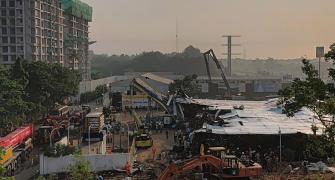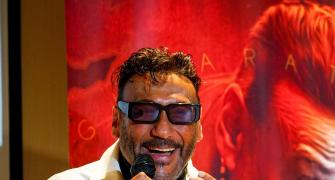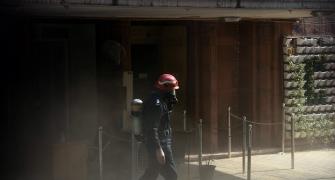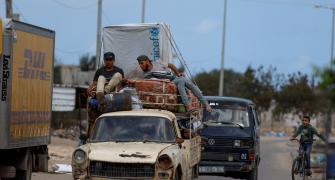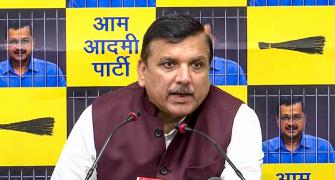Diehard Iraqi troops loyal to President Saddam Hussein on Wednesday continued to wage a bloody battle against US forces in Baghdad in a war that is likely to present Washington with challenges even after the fighting ends.
US-led forces that launched their war on March 20 inflicted a public relations setback on themselves on Tuesday when they killed three journalists -- one each from Reuters, the Arab network Al Jazeera and the Spanish channel Telecinco -- in the Iraqi capital.
The deaths of the journalists -- the Reuters cameraman and his Spanish colleague were killed by a US tank shell fired into a Baghdad hotel packed with foreign journalists -- prompted an outcry from media watchdog groups demanding an investigation and an appeal by other Arab journalists still in the city to be taken out of Baghdad safely.
In Qatar, the Al Jazeera chairman said the attack on its office in Baghdad was unnecessary.
The US military claimed it had been fired on first from the hotel and the Al Jazeera office, regretted any casualties. Reporters in the hotel said they did not hear any firing at the tank.
The United States and Britain launched the war on Iraq on March 20 to topple President Saddam Hussein and rid the country of weapons of mass destruction, which Iraq denies having.
On Wednesday, clouds of black smoke billowed into the sky and explosions reverberated across the Iraqi capital as US armour and artillery, backed by aircraft, took on apparently disorganized defenders armed largely with rifles and rocket-propelled grenades.
US Capt. Frank Thorp, at the Central Command headquarters in Qatar, said the United States was pouring more troops and armour into the capital. "There has been no organized resistance or effort to displace the coalition forces," he said.
As optimistic as the US assessments of military progress were, diplomatic obstacles loomed as President George W Bush addressed the question of reconstruction in a post-Saddam Iraq.
Bush held talks with his main war ally, British Prime Minister Tony Blair, on Tuesday at which they endorsed a vital role' for the United Nations when fighting ends, but their plans may fall short of European desires.
He did not spell out how much power the United Nations would have, an omission likely to alarm some in Europe and the Arab world. Nor did Bush elaborate on Washington's plans to place US officials alongside Iraqis in an interim administration.
French President Jacques Chirac, who led opposition to the war, said the UN alone should take charge of the economic and political reconstruction of Iraq.
"We are no longer in an era where one or two countries can control the fate of another country," Chirac told a news conference.
Chirac, however, said he agreed with Bush that the role of the UN would be vital. "I completely share this sentiment. Next we have to see how things fall into place."
Residents of Basra, Iraq's second-largest city, which fell to British troops this week, complained of a power vacuum as armed men roamed the streets, looting and pillaging.
"We are caught between two enemies, Saddam and the British," said Osama Ijam, a 24-year-old medical student on the grounds of the rundown Basra General Hospital.
"Is this what they call a liberation? We want our own government. We want our own security and our own law."
British officials said a local sheikh' would take over the leadership in Basra province.
A US-led civil administration started work in Iraq on Tuesday when a team of about 20 officials was deployed in the southern town of Umm Qasr to assess humanitarian needs, a spokesman said.
The opposition Iraqi National Congress said leaders from across southern Iraq flocked to the town of Nasiriya to greet its leader Ahmad Chalabi, but a CIA report said he and other returning exiles would find little support among Iraqis.
The classified CIA report appeared to be part of the long and bitter struggle within the Bush administration over whether Chalabi and his colleagues can be effective leaders.
The fate of Saddam, target this week of the second bombing raid aimed directly at him, was still unclear on Wednesday.
Asked if he thought the Iraqi president was still alive, Bush told reporters on Tuesday: "I don't know whether he survived.
"The only thing I can tell you is... that grip I used to describe that Saddam had around the throats of the Iraqi people is loosening. I can't tell you if all 10 fingers are off the throat but finger by finger it's coming off and the people are beginning to realize that."


